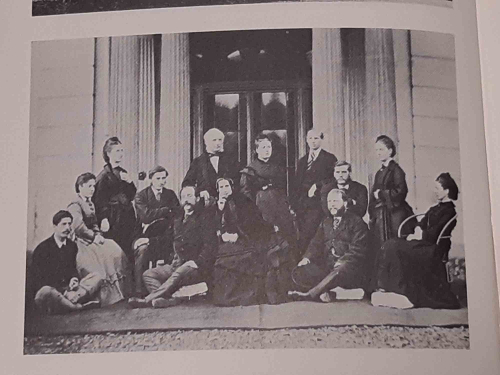
EPILOGUE Prepared by Dora Longfort.
I have completed my transcription of the first two volumes of Leonora’s Journal, the object being to improve my typing skills which I flatter myself are greatly improved by the exercise. There are another five volumes of the Journal, and I don’t feel inclined to copy any more of them, at least at the present time. However, I cannot bring myself to discard all this hard work as it is just possible that some member of the family might wish to read the Journal in future and prefer the ease of a typewritten copy. I have read the rest of the journal and made notes of some interesting events in Leonora’s life, so have decided to write an Epilogue where I will include these events. Anyone who wishes to read the whole Journal can, of course refer to the original handwritten account, although in her final years Leonora’s writing becomes more difficult to understand. (Note: Dora did not realized that the handwritten journal was to be destroyed by fire).
After the birth of Robert, Leonora had four more children at approximately two-yearly intervals – next, another son John, named after his grandfather and uncle, was born in 1817, then twin girls named Margaret and Leonora born in 1820, and finally in 1823 another boy named Richard after his deceased older brother. They all survived and grew up to live fulfilling lives, married and had a number of children.
An interesting fact about Elizabeth, Leonora’s eldest daughter. It was a matter of considerable annoyance to Leonora that women students were not allowed to study at Oxford University and she insisted on Elizabeth and her sisters receiving a good academic education with private tutors like her brothers. Elizabeth’s eldest daughter Henrietta taught at Somerville Hall, the first Oxford college for women when it opened in 1879. Sadly, Leonora did not live to see it happen.
In 1817 Leonora received a letter from Miss Cassandra Austen informing that her sister Jane had passed away and was buried in Winchester Cathedral. Although they met only once, Jane had kindly sent Leonora signed copies of the first edition of the four novels published in her lifetime, and these were greatly treasured. I don’t know what happened to most of them, perhaps they were distributed amongst the family. In the copy of ‘Pride and Prejudice, treasured by the family and published anonymously, Jane included a note saying that in revising and retitling the manuscript (initially titled ‘First Impressions’) she wished for an opening sentence which would intrigue the reader and was reminded of Leonora’s remark of how her brother John had said that Richard, as a young single man with a good fortune must be in want of a wife, and hoped she did not object to Jane adapting this comment. In her journal. Leonora comments that John and Richard are in fact rather proud to be the anonymous sources of the quotation, some of the most famous opening lines in an English novel.
Leonora lived through the reigns of four monarchs; George III (during part of which his son George was Prince Regent, giving his name to the epoch which bears that name, and who became George IV), William IV. and finally Queen Victoria who ascended to the throne in 1837
Her younger sister Emma married Henry Fitzroy in 1821, whom she had first met as a young boy in Bath about eight years previously at a dance in the Pump Room. His family moved from Bath to Oxford in 1817. Although they had corresponded since that first meeting, now they were able to renew their acquaintanceship, meeting at balls and other social events, and their friendship grew into a romance.
Henry’s father had died of probable consumption two years earlier, leaving him with a good fortune. It was a true love match. Leonora often wrote of how her sister was a very talented player on the pianoforte from an early age. She was invited to play piano concertos with a talented amateur orchestra in Oxford, which she did to great acclaim, and visitors to the Bolton household often prevailed upon her to play for them. Although a shy girl, once placed before a pianoforte keyboard she was confidence personified.
This led to an unusual incident during their honeymoon in London. Intending to attend a concert in which the famous pianist Felix Cazot was to play Mozart’s piano concerto No 20, which Emma had played about a month previously in Oxford, Emma and Henry arrived at the theatre box office to book their seats and heard that Cazot had become indisposed and could not perform. At Henry’s suggestion, Emma, being familiar with the concerto offered her services and performed the work to great acclaim. As a non-professional, the theatre management presented her with a gold chain and pendant, and matching earrings as a gesture of thanks.
Emma and Henry were blessed with seven children, one of whom did not survive. Leonora became godmother to several of them. Henry inherited a large estate outside Oxford from a distant relative who had no heirs, and the family moved there. Emma discovered in herself the ability to manage the estate largely independant of Henry.
Lucy and Freddie had no less than ten children and her sister Sarah and Leonora’s brother John had seven, all of whom survived, which was rare, and a great blessing in those days. The two sisters continued to live close to each other all their lives and frequently visited each other and Leonora. In many ways they were like three sisters. Freddy was knighted around the same time as John Bolton and thus both sisters were styled ‘Lady’ They both lived into their late seventies, and when Sarah eventually died, Lucy joined her only a couple of months later. Their graves are side by side in an Oxford cemetery.
In 1835, Sir John d’Anglais died as the result of a fall from his horse while fox hunting. As a result, Richard inherited the estate in Grasmere and had to divide his time between Grasmere and Oxford, since it was decided that Leonora and the children should stay in Oxford while they received a good education. Travel between the two locations still required four days of coach travel, and it was not until the 1840s that the burgeoning railway network resulted in this mode of transport in addition to some coach travel reducing the travel time to less than two days. Leonora missed Richard greatly at this time but was prepared to endure the separation for the sake of their children. Richard was knighted not long after his father’s death, so Leonora became Lady d’Anglais.
Her parents lived a long life. After her father retired, he was appointed as Professor Emeritus at Oxford. Upon his passing, he bequeathed his collection of Egyptian artifacts to the museum there. This included the ushabti doll which had caused Leonora so much concern when she was gifted it from the British Museum.
Her brother John had a very successful career as a lawyer in Oxford. He was knighted for services to the law and was eventually appointed as a circuit judge in the County Court. He was noted for his great knowledge of the law, and fair judgements.
The whole family visited Grasmere from time to time and met with the Wordsworths on several occasions. On every occasion they visited the grave of their first-born son which was kept in immaculate condition under the supervision of Richard’s Uncle David who continued as vicar of St Oswald’s until his death at the age of seventy-eight.
Leonora and Richard retired to Grasmere in 1848. Both Marie and Anna remained with them for their whole working lives and both were given a generous pension and cottages on the Grasmere estate in which to live out their retirement years. They were always welcome to visit the Hall.
Mrs Danvers and Mr Anderson retired when the family left Oxford. A few years previously, Mrs Danvers’ husband Captain Danvers died when his ship foundered during a typhoon in the South China Sea, and after a period of mourning she married Mr Anderson, and they lived out their lives in his cottage outside Oxford.
Richard died of pneumonia on the 4th Aug 1852, aged 61. Leonora was heart-broken but live on until 8th August 1868, aged 75 after a long widowhood, but watched over by her family. Grasmere Hall was burnt to the ground in 1880 and all the contents were destroyed. It was fortunate that the two smaller paintings of Leonora and Richard had remained in Oxford.
It seems appropriate to conclude with the final entry in Leonora’s Journal, written two days before she died. The writing is hard to decipher but I believe that this is a fair copy.
6th August 1868
This will be the last entry in my journal as my sight is fading fast and so is my time on earth. I have been blessed to live the life of a privileged woman in the nineteenth century, having seen great changes and doubtless there are many more to come for my descendants to enjoy.
I have no fear of death since I believe that I will be reunited with those that I love, particularly my dear husband Richard. No wife could wish for a gentler and more loving husband than the one with whom I was blessed, and I have missed him so much since his passing. Finally, I look forward to seeing again my sweet babe Richard who lived upon this earth for too short a time.
May the blessing of God Almighty, the Father, Son and Holy Spirit descend upon us and remain with us always. Amen.
Leonora died on 8th August, surrounded by many of her family and was buried with her husband and first-born son in the cemetery at St Oswalds, Grasmere on 12th August 1868 at a ceremony attended by her family and friends.
So ends my transcription of two volumes of Leonora d'Anglais' journal.
Dora Longfort.

d'Anglais family group 1866
If you liked this post, you can leave a comment and/or a kudos!
Click the Thumbs Up! button below to leave the author a kudos:
And please, remember to comment, too! Thanks.



Comments
The Victorian Years
I look forward, in due course, to an account of the D'anglais family in later years.
Thank you, Bronwen, for the journal of events so far.
Bittersweet..
Oh my, what a beautifully moving ending.
Over the last two years, as you have brought us Leonora's story, the characters have really become friends, and so it is a sad day to see that they have now gone on to meet their makers.
I am ecstatic that you have tied up so nicely the many threads of which this story is woven. Emma married the wonderful Henry, whom she met at Bath? Wonderful! Proper childhood sweethearts!
Baby Elizabeth's own daughter went on to teach at Oxford? I am so pleased to hear that. Those first lady academics were the very start of the Suffrage movement, and all that followed.
I am also thrilled to hear that Mrs Danvers and Mr Anderson married, an antidote to the bleak ending to "The Remains of the Day".
Thank you Bronwen, from the bottom of my heart. You have created characters here whom I have loved as friends, and yet you have managed to add some sweetness to the sorrow of parting from them.
Thank you.
Lucy xxx
"Lately it occurs to me..
what a long strange trip its been."
Gentle Goodness
Thanks very much for the story. I especially appreciated the gentle and light tone of the writing.
- Terry
She lived a long and happy life
Which probably would not have been possible if she had remained in our time.